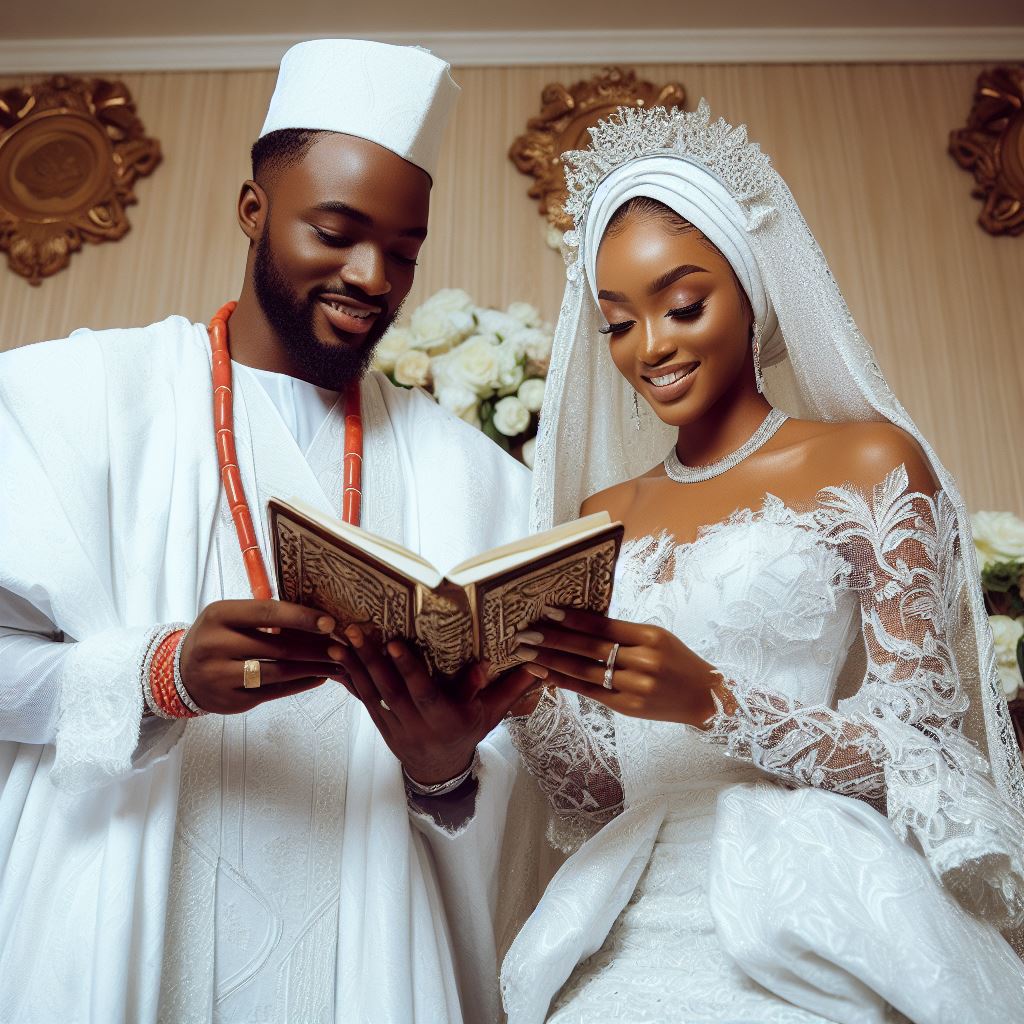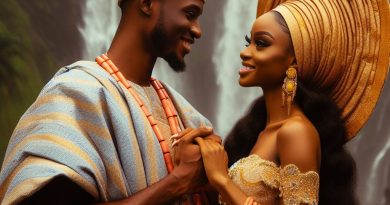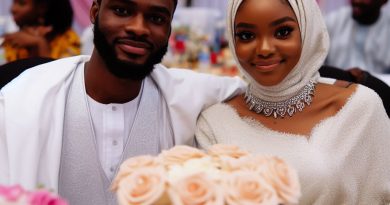Marriage in Nigeria: Combining Tradition with Faith
Last Updated on October 23, 2023
Introduction
Let’s explore marriage in Nigeria: Combining tradition with faith.
Marriage in Nigeria is a fascinating blend of tradition and faith, with deep cultural significance.
Marriage in Nigeria, a diverse and culturally rich nation, transcends the mere union of two individuals; it is a harmonious blend of tradition and faith, a tapestry woven from the threads of history and spirituality.
In this dynamic and multifaceted society, the institution of marriage carries profound significance, serving not only as a personal commitment but also as a gateway to the country’s vibrant tapestry of customs, beliefs, and practices.
This intricate fusion of tradition and faith in Nigerian marriages paints a vivid portrait of the nation’s identity, highlighting the resilient spirit of its people and the enduring importance of love, commitment, and unity in a nation where heritage and spirituality intersect with unwavering devotion.
This blog post explores the role of tradition and faith in Nigerian marriages and provides an overview of the structure of the post.
As we delve into this captivating journey through Nigerian matrimony, we will explore the time-honored rituals, the intricate ceremonies, and the profound spiritual connections that define the beautiful institution of marriage in this remarkable country.
Traditional Nigerian Marriage Customs
1. Importance of traditional customs in Nigerian marriages
- Traditional customs play a crucial role in Nigerian marriages, reflecting the cultural heritage and values.
- These customs are deeply rooted in Nigerian society and hold immense significance for the couple and their families.
- They serve as a way to honor their ancestors, maintain cultural identity, and preserve the community’s values.
2. Various traditional marriage practices
- Dowry payment: It is a common tradition where the groom’s family presents gifts or money to the bride’s family.
- Bride price: This is a form of compensation where the groom’s family pays a sum of money or valuable goods to the bride’s family.
- Traditional wedding ceremonies: These ceremonies are elaborate and vibrant, reflecting the different ethnic groups and regions of Nigeria.
3. The role of family and community
- Family plays a central role in traditional Nigerian marriages, acting as the foundation of the union.
- The couple seeks the blessings and approval of their families before proceeding with the marriage.
- Community involvement is significant as it ensures that the union is recognized and celebrated by all.
- The community serves as a support system, providing guidance, advice, and assistance throughout the marriage journey.
In short, traditional Nigerian marriage customs hold a vital place in society.
They are not simply rituals but deeply rooted practices that bind families, communities, and cultural identity.
These customs reflect the values, beliefs, and traditions that have been passed down through generations.
By incorporating these customs into modern marriages, Nigerians are able to combine their traditions with their faith, creating a unique and meaningful union.
Read: Navigating Challenges: A Sermon on Marriage Trials
Influence of Religion in Nigerian Marriages
Religion holds a significant place in Nigerian society, with Christianity and Islam playing major roles.
Nigerian marriages are greatly influenced by religious beliefs and practices, as they form an essential part of the cultural fabric.
Let’s explore the impact of religion on marriages in Nigeria.
1. Strong Religious Influence
- Christianity and Islam have a profound influence on Nigerian society and marriages.
- Religious principles govern various aspects of life, including relationships and marriage.
- Religious institutions play a central role in promoting traditional values in marital unions.
2. Role of Religious Beliefs and Practices
- Religious beliefs and practices shape the expectations and behaviors of Nigerian couples.
- Christian and Islamic teachings emphasize the importance of fidelity, love, and commitment in marriage.
- Religion provides a moral compass that guides couples in making decisions and resolving conflicts.
- Religious teachings also emphasize the sanctity of the institution of marriage and encourage its preservation.
3. Integration of Religious Ceremonies, Prayers, and Blessings
- Religious ceremonies are an integral part of Nigerian marriage traditions.
- In Christian marriages, couples exchange vows in the presence of a priest or pastor.
- Islamic weddings are performed by an Imam according to the principles of Sharia Law.
- Prayers and blessings are recited during the wedding ceremony, seeking divine guidance and support.
Strong Religious Influence
The marriage process in Nigeria involves several religious rituals that symbolize commitment and spirituality.
These rituals not only unite the couple but also foster a sense of community and shared beliefs.
Different ethnic groups in Nigeria have their unique customs and traditions associated with marriage.
However, religion acts as a unifying force, transcending ethnic boundaries and bringing people together under a shared faith.
Besides the wedding ceremony, religious practices continue to influence Nigerian marriages throughout the couple’s life together.
Couples frequently attend religious services, prayer meetings, and other spiritual gatherings within their religious communities.
Role of Religious Beliefs and Practices
Religious leaders also play a crucial role in providing guidance and counseling to married couples.
They offer advice on marital challenges, encourage communication, and emphasize the importance of mutual respect and understanding.
Moreover, religious beliefs often shape the gender roles and expectations within Nigerian marriages.
Traditional Christian and Islamic teachings assign specific roles to husbands and wives, with the husband being the head of the household and the wife expected to be submissive.
Integration of Religious Ceremonies, Prayers, and Blessings
Despite the influence of religion, modern Nigerian marriages often integrate traditional values with contemporary ideals.
Many couples strive to strike a balance between their religious beliefs and the changing societal norms.
In fact, religion plays a significant role in Nigerian marriages. It shapes the values, rituals, and expectations of couples, fostering a strong moral foundation.
By integrating religious beliefs into their marital journey, Nigerians combine tradition with faith, finding strength in their shared spiritual bond.
Read: Marriage Vows: Their Origin and Importance in Nigeria

Challenges of Combining Tradition and Faith in Nigerian Marriages
When it comes to marriage in Nigeria, couples often find themselves struggling to balance cultural traditions and religious practices.
This delicate dance between tradition and faith can give rise to potential conflicts and dilemmas that require careful consideration and compromise.
Potential Conflicts
- Intersecting tradition and faith can lead to conflicts between different cultural beliefs and religious doctrines.
- Family expectations and societal pressures can clash with personal religious convictions and practices.
- The rigid adherence to cultural norms may create tensions in the relationship, particularly if they go against religious principles.
- Disagreements about religious ceremonies and rituals can strain the bond between partners and their families.
- The influence of extended family members and their expectations can exacerbate conflicts between tradition and faith in marriage.
Dilemmas Faced by Couples
- Couples often face the dilemma of choosing between honoring family traditions or following their religious beliefs in wedding ceremonies and rituals.
- Decisions regarding the religious upbringing of their children can become a significant dilemma for couples with different faiths or cultural backgrounds.
- Balancing the expectations of both sets of parents and extended family members can pose a significant challenge to couples.
- The pressure to conform to societal norms can make it difficult for couples to freely express their religious beliefs and cultural values.
- The fear of judgment and criticism from their communities can create dilemmas for couples trying to reconcile tradition and faith.
Navigating the Challenges
- Communication and understanding are vital in navigating the challenges of combining tradition and faith in Nigerian marriages.
- Couples can find a middle ground by identifying shared values and principles that align with both tradition and faith.
- Compromising and finding alternatives that respect both cultural traditions and religious practices can help ease conflicts.
- Seeking guidance from religious leaders or pre-marital counselors who understand the cultural and religious context can provide valuable insights and support.
- Embracing open-mindedness and flexibility fosters an environment of respect and understanding between partners.
Ultimately, successfully combining tradition and faith in Nigerian marriages requires a deep commitment to each other, empathy, and a willingness to adapt.
Couples who navigate these challenges with patience and love can build a strong foundation for a harmonious marriage that honors both their cultural heritage and religious beliefs.
Read: The Role of Faith in Strengthening Nigerian Marriages
Success Stories of Combining Tradition and Faith
Examples of successful marriages that have effectively combined tradition and faith in Nigeria
- The Adesanyas: This couple from Lagos, Nigeria, successfully merged their Yoruba traditions with their Christian faith. They incorporated traditional wedding rites while also having a church ceremony to exchange their vows.
- The Okoyes: Hailing from the Igbo tribe, the Okoyes beautifully blended their cultural heritage with their Catholic beliefs. Their traditional Igbo wedding attire and rituals were followed by a solemn church wedding, symbolizing their commitment in both aspects.
- The Abdullahis: Despite belonging to different religions, Amina, a Muslim, and Chinedu, a Christian, united their families through a unique blend of tradition and faith. They had both an Islamic and Christian ceremony, respecting and honoring the beliefs of each family.
- The Adewales: This couple showcased the harmony between tradition and faith by combining their Nigerian customs with their Islamic beliefs. They incorporated elements of their Yoruba heritage, such as the traditional engagement ceremony, alongside Islamic prayers and blessings.
Embracing Cultural Heritage and Religious Beliefs:
These successful couples have exemplified the art of embracing both their cultural heritage and religious beliefs.
They have shown that it is possible to honor their traditions while also maintaining strong faith practices.
By incorporating traditional wedding rites, attire, and customs, these couples have paid homage to their Nigerian roots.
Whether it be the exchange of dowries, performing traditional dances, or wearing traditional garb, they have celebrated their cultural identity in a meaningful way.
Simultaneously, these couples have deeply embraced their religious beliefs.
They have held traditional church ceremonies, observed Islamic rituals, or conducted interfaith blessings to affirm their commitment to their faiths.
Lessons from Success Stories
- Respect and Open-mindedness: The success stories highlight the importance of respecting each other’s cultural and religious backgrounds. Being open-minded and willing to learn from one another creates a strong foundation for a successful union.
- Communication is Key: Effective communication is crucial in navigating the complexities of combining tradition and faith. Discussing expectations, understanding each other’s beliefs, and finding common ground are vital for a harmonious marriage.
- Compromise and Flexibility: Successful couples have showcased their ability to compromise and be flexible when integrating tradition and faith. They have found a balance that reflects their shared values while honoring their individual backgrounds.
- Unity in Diversity: These success stories reveal that unity can be achieved despite differences in tradition and faith. Embracing diversity enriches a marriage and strengthens the bond between partners and their families.
In brief, the success stories of couples who have effectively combined tradition and faith in Nigeria are inspiring.
They exemplify the beauty of merging cultural heritage and religious beliefs, promoting respect, open-mindedness, effective communication, and compromise.
These couples serve as role models, showing that love, faith, and tradition can indeed coexist harmoniously in a sacred union.
Read: Foundations of a Godly Marriage: Biblical Insights
Conclusion
The blog post has highlighted the significance of harmonizing tradition and faith in Nigerian marriages.
By combining these two aspects, couples can create a strong foundation for their union.
The importance of understanding each other’s cultural practices and beliefs cannot be overstated.
It fosters unity and respect within the marriage, and contributes to a deeper connection between the couple.
Nigeria, with its diverse cultural heritage, has a unique opportunity to embrace the best of both worlds.
The country’s rich traditions, combined with strong religious beliefs, can shape the future of marriage in Nigeria.
By incorporating tradition and faith into their marriages, Nigerians can build lasting relationships based on love, respect, and understanding.
The key lies in finding the balance between the two, ensuring that neither aspect is neglected or undermined.
As Nigeria continues to evolve and modernize, it is crucial to remember the value of tradition and faith in preserving the sanctity of marriage.
By doing so, couples can navigate the challenges that may arise and celebrate the beautiful diversity of Nigerian culture.
Nigerian marriages have a bright future ahead, as couples strive to combine the best of both worlds.
By honoring tradition and embracing faith, they can forge strong, enduring relationships that transcend time and bring joy and fulfillment to their lives.


